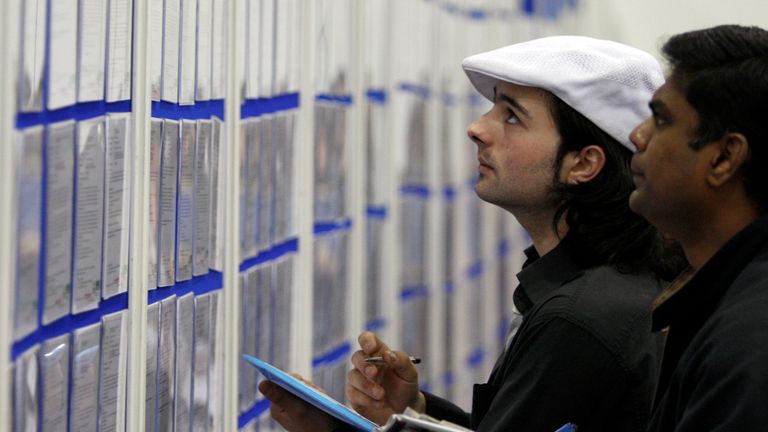The number of job vacancies has topped 1 million for the first time on record as the economy recovers from the pandemic, the Office for National Statistics (ONS) said.
Figures published by the ONS also showed the number of employees on payrolls rose by 182,000 last month – though was still 201,000 below pre-crisis levels.
Meanwhile the headline unemployment rate, covering the three months to June, slipped back to 4.7% – down from 4.8% the month before.
Image: Unemployment fell to 4.7%At the same time annual regular pay growth – a measure that has been skewed in recent months because of the impact of the pandemic on the jobs market – soared to 7.4%.
Chancellor Rishi Sunak said the figures showed the government’s plan for jobs was working, adding: “I know there could still be bumps in the road but the data is promising.”
AdvertisementThe figures come after GDP data last week showed the economy bouncing back with growth of 4.8% in the second quarter.
According to the ONS labour market update, vacancies hit a record 953,000 in the three months to July, 168,000 higher than pre-pandemic levels.
More from Business COVID-19: Share of households buying groceries online falls to lowest level since October Just Eat orders surge by 58 million in first half of year but investment splurge hits bottom line Jeff Bezos might scupper NASA’s 2024 moon landing – if spacesuit delays don’t do it first Government energy plans to make hydrogen from fossil fuel will result in missed climate targets , says environmental group Cobham eyes potential disposals after agreeing £2.57bn Ultra takeover deal Mining giant BHP says it could quit oil and gas industrySingle-month vacancy estimates showed that last month the figure topped 1 million for the first time according to records going back to 2001.
The figures come at a time when many employers say they are struggling to find staff.
Image: The hospitality sector has been among those struggling to find staffSectors such as hospitality are among those affected while elsewhere, in-demand lorry drivers are being offered signing-on bonuses worth thousands of pounds to work for major retailers.
Jonathan Athow, ONS deputy national statistician for economic statistics, said: “The world of work continues to rebound robustly from the effects of the pandemic.
“The number of people on payroll was up again strongly and has now grown over half a million in the past three months, regaining about four-fifths of the fall seen at the start of the pandemic.
“Meanwhile early survey figures show that the number of job vacancies passed one million for the first time ever in July.”
Mr Athow added that there was no sign of redundancies starting to pick up ahead of the the government’s furlough scheme winding down.
That may ease fears that the withdrawal of taxpayer support for jobs will lead to temporary pandemic lay-offs becoming permanent.
But the continued acceleration in earnings growth could prove a headache for Mr Sunak as next month’s data would normally be used to calculate the rise in the state pension under the government’s “triple lock” guarantee.
That guarantee means that pensions increase by the rate of average earnings, inflation, or 2.5% – whichever is higher.
Image: Lorry drivers are being offered signing-on bonuses worth thousands of poundsThe Office for Budget Responsibility (OBR), the government’s fiscal watchdog, has warned that if as some forecasts have suggested, earnings growth hits 8%, it would add £3bn a year to government spending.
However there has already been a hint that the triple lock could be ditched, with the prime minister last month saying there had to be “fairness for pensioners and taxpayers”.
The ONS says the latest earnings figures have been inflated by comparisons with last year when the pandemic first hit the labour market, and since when there has been a fall in the number and proportion of lower-paid jobs.
Stripping these out it estimates underlying regular wage growth at between 3.5% and 4.9%.
